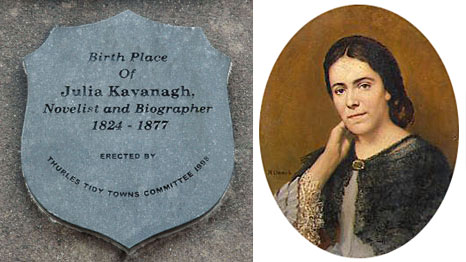Julia Kavanagh (Born this day, 7th January 1824 – Died 28th October 1877) was an Irish Novelist & Biographer, born in Thurles, Co Tipperary, the only child to parents, Dublin born Morgan, Peter (Latter his Confirmation Name) Kavanagh (Irish author, poet, and novelist 1800 – 1874) and Bridget (née Fitzpatrick, latter who died 1888).
 Her once small house sadly no longer exists, but stood at what is today the entrance to the Presentation Convent Secondary School, close to the junction leading from Cathedral Street into Mitchel Street, here in Thurles, Co. Tipperary.
Her once small house sadly no longer exists, but stood at what is today the entrance to the Presentation Convent Secondary School, close to the junction leading from Cathedral Street into Mitchel Street, here in Thurles, Co. Tipperary.
An Irish Catholic, life for the young Miss Kavanagh was hard. She was partially crippled from youth (curvature of the spine), nevertheless she, through her own genius and strong connections, would carve out a successful career as a novelist, biographer and travel writer.
Her parents were married in 1823 and moved with Julia from Thurles to London, her father possibly as a teacher of languages. In late 1825 or early 1826 they moved to Paris, before returning to London again in 1837. When they returned to London, over the next year Morgan arranged for Julia to receive special treatment for her spinal problem. They returned to Paris in 1839 and stayed there until the early 1840s. It was during this early life with her parents in Paris, that Julia conquered her initial mastery of the French language and her remarkable insight into French modes of thinking, which was then perfected by her later long residences in Paris, Rouen and Nice.
Morgan was alone when he lived at 28 Dean Street, London in the early 1850s. Julia and her mother had parted from Morgan around 1846 and neither Julia or her mother are listed in the 1851 census for that address.
It was at this same address (28 Dean Street, Soho) that her father would become landlord & sub-lets two rooms to atheist Karl Marx, in Dec. 1850. This same address would also be the location at which Marx would write ‘Das Kapital,’ (1867) with the assistance of fellow revolutionary socialist Friedrich Engels. It was to here also that Friedrich Engels would send postal orders for £1 or £5 notes, each cut in half and sealed in separate envelopes, to avoid postal theft and in order that the impoverished and resident Marx family could pay their rent and continue to survive.
Note: Today, 26-29 Dean Street Soho, London, houses the famous restaurant “Quo Vadis,” (Latin: “Where are you going?”).
Julia now began to support herself and her invalid mother Bridget, with her writing career. Her first book was entitled “The Three Paths (1847), a story for the young, however her first work to attract the attention of her large readership was “Madeleine, a Tale of Auvergne,” (1848), a story of “heroic charity and living faith founded on fact.”
Her other works included; “Woman in France during the 18th Century,” (1850), “Nathalie,” (1851), “Women of Christianity,” (1852), “Daisy Burns,” (1853), “Rachel Gray,” (1855), “Adele,” (1857), “A Summer and Winter in the Two Sicilies,” (1858), “French Women of Letters,” & “English Women of Letters” (1862), “Queen Mab,” (1863), “Beatrice,” (1865) “Dora,” (1868), “Silvia,” (1870), “Bessie,” (1872), “John Dorrien,” (1875) & finally following her death, unmarried, on October 28th, 1877, at Nice, France, “Forget-Me-Nots,” (1878, a posthumous edition with preface by C. W. Wood)
Outside of her life as a novelist, her years appear rather uneventful, with a great part of her time devoted to the care of her invalid & later widowed mother. At the outbreak of the Franco-German War around 1870, Julia with her mother, both of whom were resident in Paris, moved to Rouen and then to Nice, where she died in her fifty-fourth year, following an accident, having fallen from her bed. Julia’s last words are reported to have been spoken in French: “Oh Mama! How silly I am to have fallen….”
Her mother Bridget continued to live in Nice until her death in 1888, but how she managed to cope financially after Julia’s death is not known. However, in 1884 Bridget donated a painting of Julia, by French artist Henri Chanet (dated 1875), to the National Gallery of Ireland.
Julia’s father is known to have entered into a common-law marriage with one Marie Rose in about 1856 and they had three children; Alfred, Matilda and Alexander Morgan. Her father died in 1874 and a Coroner’s Inquest, held at Islington, on February 14th 1874, indicates that, like Julia herself; his death was also caused by a fall.

Leave a Reply